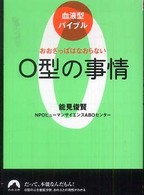- ホーム
- > 洋書
- > 英文書
- > Religion / Ethics
Full Description
The late middle ages was a period of great speculative innovation in Christology, within the framework of a standard Christological opinion established by the Franciscan John Duns Scotus and the Dominican Hervaeus Natalis. According to this view, the Incarnation consists in some kind of dependence relationship between an individual human nature and a divine person. The Metaphysics of Christology in the Late Middle Ages: William of Ockham to Gabriel Biel explores ways in which this standard opinion was developed in the late middle ages. Theologians offered various proposals about the nature of the relationship--as a categorial relation, or an absolute quality, or even just the divine will.
Author Richard Cross also considers alternative positions: Peter Auriol's claim that the divine person is a 'quidditative termination' of the human nature; the homo assumptus theology of John Wyclif and Jan Hus; and the retrieval of a truly Thomistic Christology in the fifteenth century in the thought of John Capreolus and Denys the Carthusian. The fourteenth and fifteenth centuries were pre-eminently the age of nominalism, and this book examines the impact of nominalism on Christological discussions, as well as the development of Thomist and Scotist theology in the period. It also provides essential background for the correct understanding of Reformation Christology.
Contents
Abbreviations
Introduction: The character of late medieval Christology
I: The opinio communis
1: The tradition of Hervaeus Natalis
2: Oxford after Scotus
3: The tradition of Scotus
4: The opinio communis without real relations
5: Christological semantics and the impact of nominalism
II: Alternative trajectories
6: Peter Auriol
7: Unions by perichoresis and activity
8: Homo assumptus Christologies
9: The recovery of a Thomist tradition
Conclusion: Some programmes for Christology
Bibliography
Index








